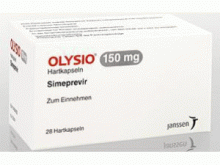司美匹韦simeprevir hard capsules(OLYSIO)说明书
 产地国家:比利时
处方药:是
所属类别: 150毫克/胶囊 28胶囊/盒
包装规格: 150毫克/胶囊 28胶囊/盒
计价单位:盒
生产厂家英文名:Janssen-Cilag
原产地英文商品名:OLYSIO hard capsules 150mg/caps 28caps/box
原产地英文药品名:simeprevir
中文参考商品译名:Olysio硬胶囊 150毫克/胶囊 28胶囊/盒
中文参考药品译名:司美匹韦
产地国家:比利时
处方药:是
所属类别: 150毫克/胶囊 28胶囊/盒
包装规格: 150毫克/胶囊 28胶囊/盒
计价单位:盒
生产厂家英文名:Janssen-Cilag
原产地英文商品名:OLYSIO hard capsules 150mg/caps 28caps/box
原产地英文药品名:simeprevir
中文参考商品译名:Olysio硬胶囊 150毫克/胶囊 28胶囊/盒
中文参考药品译名:司美匹韦
简介
日,强生(JNJ)丙肝新药OLYSIO(simeprevir)获欧盟批准,联合其他药物,用于丙型肝炎病毒(HCV)基因型1和4慢性丙型肝炎(CHC)成人患者的治疗。该药将为欧洲患者提供一种新的三联疗法,同时将提供有史以来首个为期12周的无干扰素且不依赖利巴韦林及其他药物的治疗选择。OLYSIO的获批,是基于II期COSMOS、3个关键III期QUEST-1、QUEST-2、PROMISE的数据。丙型肝炎(HCV)是一种血源性传染性肝脏疾病,若不及时治疗,可能对肝脏造成重大损害。关于OLYSIO(simeprevir):Simeprevir是新一代NS3/4A蛋白酶抑制剂,为每日一次的口服药物,由Medivir公司和杨森(Janssen)联合开发,用于治疗慢性丙型肝炎成年患者的代偿性肝病,包括各个阶段的肝纤维化,其工作原理是通过阻断蛋白酶,来抑制HCV在肝脏细胞中的复制。simeprevir分别于2013年9月和11月获日本(在日本的商品名为Sovriad)和FDA批准,与聚乙二醇化干扰素和利巴韦林(ribavirin)联合用药,用于基因型-1慢性丙型肝炎病毒(HCV)感染者的治疗。simeprevir是一种新的直接作用抗病毒药物,也是第二代蛋白酶抑制剂,给药方式为:simeprevir+聚乙二醇干扰素+利巴韦林联合治疗12周,随后进行聚乙二醇干扰素+利巴韦林治疗12周或36周批准日期:2014年5月20日 公司:扬森研发有限公司OLYSIO (司美匹韦 simeprevir)胶囊,为口服使用初次批准–2013 作用机制 Simeprevir是一种对丙型肝炎病毒直接作用抗病毒(DAA)药[见微生物学]。 适应证和用途 OLYSIO是一种丙型肝炎病毒(HCV)NS3/4A蛋白酶抑制剂适用为慢性丙型肝炎(CHC)感染作为抗病毒治疗方案联用的一个组分的治疗。(1)已确定OLYSIO在HCV基因1型被感染受试者有代偿的肝病(包括肝硬变)与聚乙二醇干扰素α和利巴韦林联用的疗效。(2)OLYSIO必须不用作单药治疗。(3)筛选患者with HCV基因1a型感染在基线时病毒存在NS3 Q80K多态性被强烈建议。对有被HCV基因1a型含Q80K多态性感染患者应考虑另外治疗。 剂量和给药方法 (1)一粒150 mg胶囊每天1次与食物服用。(2)OLYSIO应与聚乙二醇干扰素α和利巴韦林两药给予。推荐的OLYSIO与聚乙二醇干扰素α和利巴韦林的治疗时间为12周,接着或接着或12或36另外周聚乙二醇干扰素α和利巴韦林周依赖于以前反应状态。(3)对聚乙二醇干扰素α和利巴韦林专门剂量指导,见其相应处方资料。(4)对东亚血统患者不能做剂量推荐。(5)对有中度至严重肝受损患者不能做剂量推荐。 剂型和规格胶囊:150mg 禁忌证 (1)对聚乙二醇干扰素α和利巴韦林的所有禁忌证也应用于OLYSIO与聚乙二醇干扰素α和利巴韦林联合治疗。(2)因为利巴韦林可能致出生缺陷和胎儿死亡,在妊娠妇女和男性其女伴侣妊娠中禁忌OLYSIO与聚乙二醇干扰素α和利巴韦林联用。 警告和注意事项 (1)胚胎胎儿毒性(与利巴韦林和聚乙二醇干扰素α使用):利巴韦林可能致出生缺陷和胎儿死亡和动物研究曾证明干扰素有流产作用;女性患者和男性患者的女性伴侣中避免妊娠。开始治疗前患者必须有阴性妊娠测试,治疗期间至少使用两种有效避孕方法,和每月进行妊娠测试。(2)光敏感:用OLYSIO,聚乙二醇干扰素α和利巴韦林联合治疗期间曾观察到严重光敏感反应。用阳光保护措施和限制阳光暴露。如光敏感反应发生考虑终止。(3)皮疹:用OLYSIO,聚乙二醇干扰素α和利巴韦林联合治疗期间曾观察到皮疹。如发生严重皮疹终止OLYSIO。 不良反应 治疗的头12周期间接受OLYSIO与聚乙二醇干扰素和利巴韦林联用受试者中最常报道不良反应(大于20%受试者)和与接受安慰剂与聚乙二醇干扰素α和利巴韦林联用受试者比较发生频数至少较高3%为:皮疹(包括光敏感),瘙痒和恶心。 药物相互作用 OLYSIO与药物是CYP3A的中度或强诱导剂或抑制剂的共同给药可能显著影响simeprevir的血浆浓度。治疗前和期间必须考虑药物-药物相互作用的潜能。英文版说明书
IMPORTANT SAFETY INFORMATIONContraindications•There are no specific contraindications to OLYSIO®. The contraindications to other antiviral drugs administered with OLYSIO® for the treatment of CHC infection also apply to OLYSIO® combination treatment. Prescribers should consult the complete prescribing information for these drugs for a description of contraindications.Warnings and Precautions•Serious Symptomatic Bradycardia When Co-administered With Sofosbuvir and Amiodarone: Postmarketing cases of symptomatic bradycardia and cases requiring pacemaker intervention have been reported when amiodarone is co-administered with sofosbuvir in combination with another HCV direct-acting antiviral, including OLYSIO®. A fatal cardiac arrest was reported in a patient receiving a sofosbuvir-containing regimen (ledipasvir/sofosbuvir). Bradycardia has generally occurred within hours to days, but cases have been observed up to 2 weeks after initiating HCV treatment. Patients also taking beta blockers, or those with underlying cardiac comorbidities and/or advanced liver disease, may be at increased risk for symptomatic bradycardia with co-administration of amiodarone. Bradycardia generally resolved after discontinuation of HCV treatment. The mechanism for this bradycardia effect is unknown.Co-administration of amiodarone with OLYSIO® in combination with sofosbuvir is not recommended. For patients taking amiodarone who have no other alternative treatment options, and who will be co-administered OLYSIO® and sofosbuvir:◦Counsel patients about the risk of serious symptomatic bradycardia.◦Cardiac monitoring in an in-patient setting for the first 48 hours of co-administration is recommended, after which outpatient or self-monitoring of the heart rate should occur on a daily basis through at least the first 2 weeks of treatment.Patients who are taking sofosbuvir in combination with OLYSIO® who need to start amiodarone therapy due to no other alternative treatment options should undergo similar cardiac monitoring as outlined above.Due to amiodarone's long elimination half-life, patients discontinuing amiodarone just prior to starting sofosbuvir in combination with OLYSIO® should also undergo similar cardiac monitoring as outlined above.Patients who develop signs or symptoms of bradycardia should seek medical eva luation immediately. Symptoms may include near-fainting or fainting, dizziness or lightheadedness, malaise, weakness, excessive tiredness, shortness of breath, chest pain, confusion, or memory problems.•Hepatic Decompensation and Hepatic Failure: Hepatic decompensation and hepatic failure, including fatal cases, have been reported postmarketing in patients treated with OLYSIO® in combination with Peg-IFN-alfa and RBV or in combination with sofosbuvir. Most cases were reported in patients with advanced and/or decompensated cirrhosis who are at increased risk for hepatic decompensation or hepatic failure. Because these events have been reported voluntarily during clinical practice, estimates of frequency cannot be made and a causal relationship between treatment with OLYSIO® and these events has not been established.OLYSIO® is not recommended for patients with moderate or severe hepatic impairment (Child-Pugh Class B or C).In clinical trials of OLYSIO®, modest increases in bilirubin levels were observed without impacting hepatic function. Postmarketing cases of hepatic decompensation with markedly elevated bilirubin levels have been reported. Monitor liver chemistry tests before and as clinically indicated during OLYSIO® combination therapy. Patients who experience an increase in total bilirubin to greater than 2.5 times the upper limit of normal should be closely monitored:◦Patients should be instructed to contact their healthcare provider if they have onset of fatigue, weakness, lack of appetite, nausea and vomiting, jaundice, or discolored feces.◦Discontinue OLYSIO® if elevation in bilirubin is accompanied by liver transaminase increases or clinical signs and symptoms of hepatic decompensation.•Risk of Serious Adverse Reactions Associated With Combination Treatment: OLYSIO® should be used in combination with other antiviral drugs for the treatment of CHC infection. Therefore, consult the prescribing information for these drugs before starting therapy with OLYSIO®.•Photosensitivity: Photosensitivity reactions have been observed with OLYSIO® combination therapy. Serious photosensitivity reactions resulting in hospitalization have been observed with OLYSIO® in combination with Peg-IFN-alfa and RBV. Photosensitivity reactions occurred most frequently in the first 4 weeks of treatment, but can occur at any time during treatment. Photosensitivity may present as an exaggerated sunburn reaction, usually affecting areas exposed to light (typically the face, "V" area of the neck, extensor surfaces of the forearms, and dorsa of the hands). Manifestations may include burning, erythema, exudation, blistering, and edema.Use sun protective measures and limit sun exposure during treatment with OLYSIO®. Avoid use of tanning devices during treatment with OLYSIO®. Discontinuation of OLYSIO® should be considered if a photosensitivity reaction occurs and patients should be monitored until the reaction has resolved. If a decision is made to continue OLYSIO® in the setting of a photosensitivity reaction, expert consultation is advised.•Rash: Rash has been observed with OLYSIO® combination therapy. Rash occurred most frequently in the first 4 weeks of treatment, but can occur at any time during treatment. Severe rash and rash requiring discontinuation of OLYSIO® have been reported in subjects receiving OLYSIO® in combination with Peg-IFN-alfa and RBV. Most of the rash events in OLYSIO®-treated patients were of mild or moderate severity. Patients with mild to moderate rashes should be followed for possible progression of rash, including the development of mucosal signs (e.g., oral lesions, conjunctivitis) or systemic symptoms. If the rash becomes severe, OLYSIO® should be discontinued. Patients should be monitored until the rash has resolved.•Sulfa Allergy: OLYSIO® contains a sulfonamide moiety. In subjects with a history of sulfa allergy (n=16), no increased incidence of rash or photosensitivity reactions has been observed. However, there are insufficient data to exclude an association between sulfa allergy and the frequency or severity of adverse reactions observed with the use of OLYSIO®.•Risk of Adverse Reactions or Reduced Therapeutic Effect Due to Drug Interactions: Co-administration of OLYSIO® with substances that are moderate or strong inducers or inhibitors of cytochrome P450 3A (CYP3A) is not recommended as this may lead to significantly lower or higher exposure of simeprevir, respectively, which may result in reduced therapeutic effect or adverse reactions.Adverse Reactions•Use With Peg-IFN-alfa and RBV: Adverse reactions (all grades, at least 3% higher frequency) for OLYSIO® with Peg-IFN-alfa and RBV vs. Peg-IFN-alfa and RBV alone in the first 12 weeks were rash (including photosensitivity) (28% vs. 20%), pruritus (22% vs. 15%), nausea (22% vs. 18%), myalgia (16% vs. 13%), and dyspnea (12% vs. 8%).•Use With Sofosbuvir: The most common (> 10%) adverse reactions reported during 12 weeks' treatment with OLYSIO® in combination with sofosbuvir without RBV were fatigue (25%), headache (21%), nausea (21%), insomnia (14%), and pruritus (11%). Rash and photosensitivity were reported in 11% and 7% of subjects, respectively. During 24 weeks' treatment with OLYSIO® in combination with sofosbuvir, dizziness (16%) and diarrhea (16%) were also commonly reported.Use in Specific Populations•Pregnancy Category C: Adequate and well-controlled trials with OLYSIO® have not been conducted in pregnant women. OLYSIO® should be used during pregnancy only if the potential benefit justifies the potential risk. Female patients of childbearing potential should use an effective contraceptive method.•Race: Patients of East Asian ancestry exhibit higher simeprevir exposures. In clinical trials, higher simeprevir exposures have been associated with increased frequency of adverse reactions, including rash and photosensitivity. There are insufficient safety data to recommend an appropriate dose for patients of East Asian ancestry. The potential risks and benefits of OLYSIO® should be carefully considered prior to use in patients of East Asian ancestry.•Renal Impairment: No dose adjustment of OLYSIO® is required in patients with mild, moderate or severe renal impairment. The safety and efficacy of OLYSIO® have not been studied in HCV-infected patients with severe renal impairment (creatinine clearance below 30 mL/min) or end-stage renal disease, including patients requiring dialysis. Simeprevir is highly protein-bound; therefore, dialysis is unlikely to result in significant removal of simeprevir.•Hepatic Impairment: No dose adjustment of OLYSIO® is required in patients with mild hepatic impairment (Child-Pugh Class A). The safety and efficacy of OLYSIO® have not been established in HCV-infected patients with moderate or severe hepatic impairment (Child-Pugh Class B or C). OLYSIO® is not recommended for patients with moderate or severe hepatic impairment (Child-Pugh Class B or C). There have been postmarketing reports of hepatic decompensation, hepatic failure, and death in patients with advanced or decompensated cirrhosis receiving OLYSIO® combination therapy. Simeprevir exposures are increased in patients with moderate or severe hepatic impairment (Child-Pugh Class B or C). In clinical trials, higher simeprevir exposures have been associated with increased frequency of adverse reactions, including increased bilirubin, rash and photosensitivity.•Other HCV Genotypes: The safety and efficacy of OLYSIO® have not been established in patients infected with other HCV genotypes.•Liver Transplantation: The safety and efficacy of OLYSIO® have not been studied in liver transplant patients.Not a complete list of Uses in Specific Populations.Consult the PI for Peg-IFN-alfa and RBV or sofosbuvir before starting therapy with OLYSIO®. Safety information related to these drugs also applies to their use in OLYSIO® combination treatment.用药温馨提示:当您服用此药物时,需定期接受医疗专业人士的检查,以便随时针对其药效、副作用等情况进行监测。本网站所包含的信息旨在为患者提供帮助,不能代替医学建议和治疗。
药品价格查询,专业药品查询网站,药品说明书查询,药品比价 » 司美匹韦simeprevir hard capsules(OLYSIO)说明书
药品价格查询,专业药品查询网站,药品说明书查询,药品比价 » 司美匹韦simeprevir hard capsules(OLYSIO)说明书





